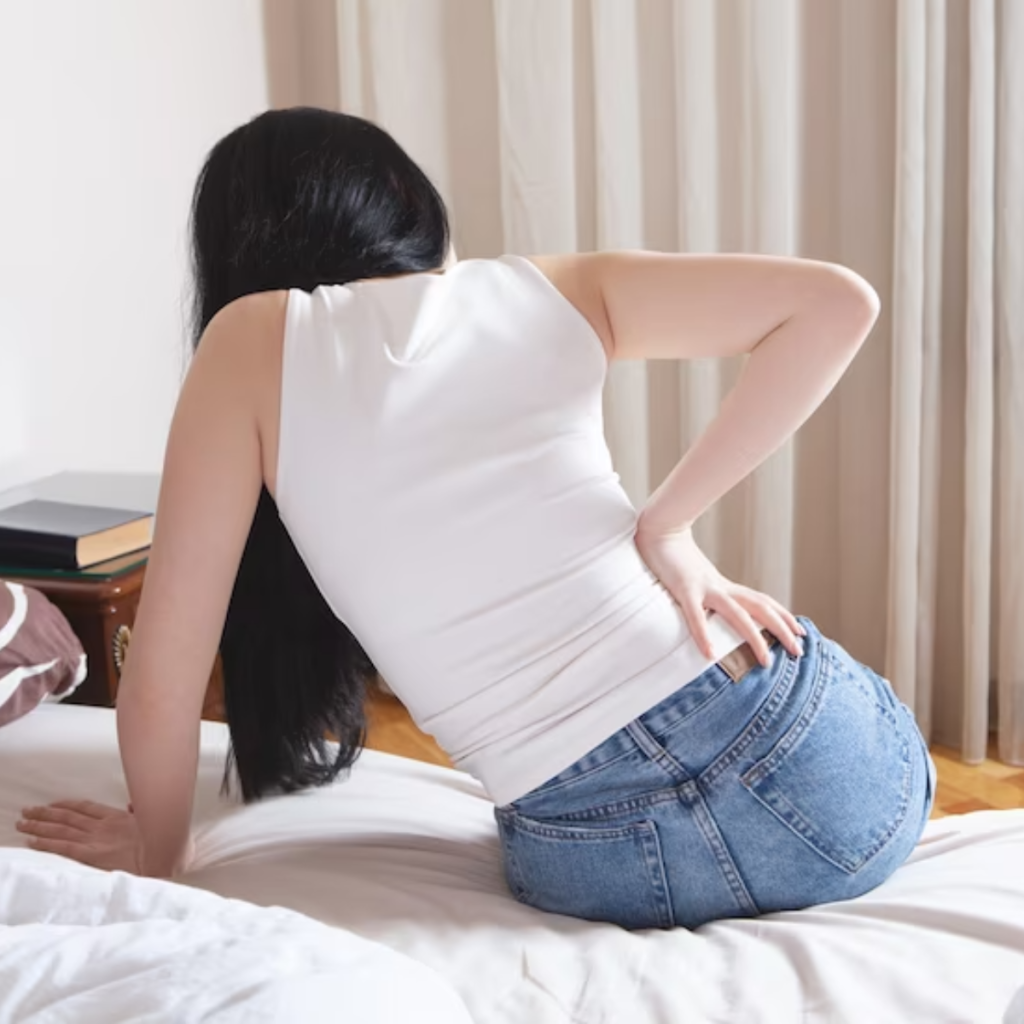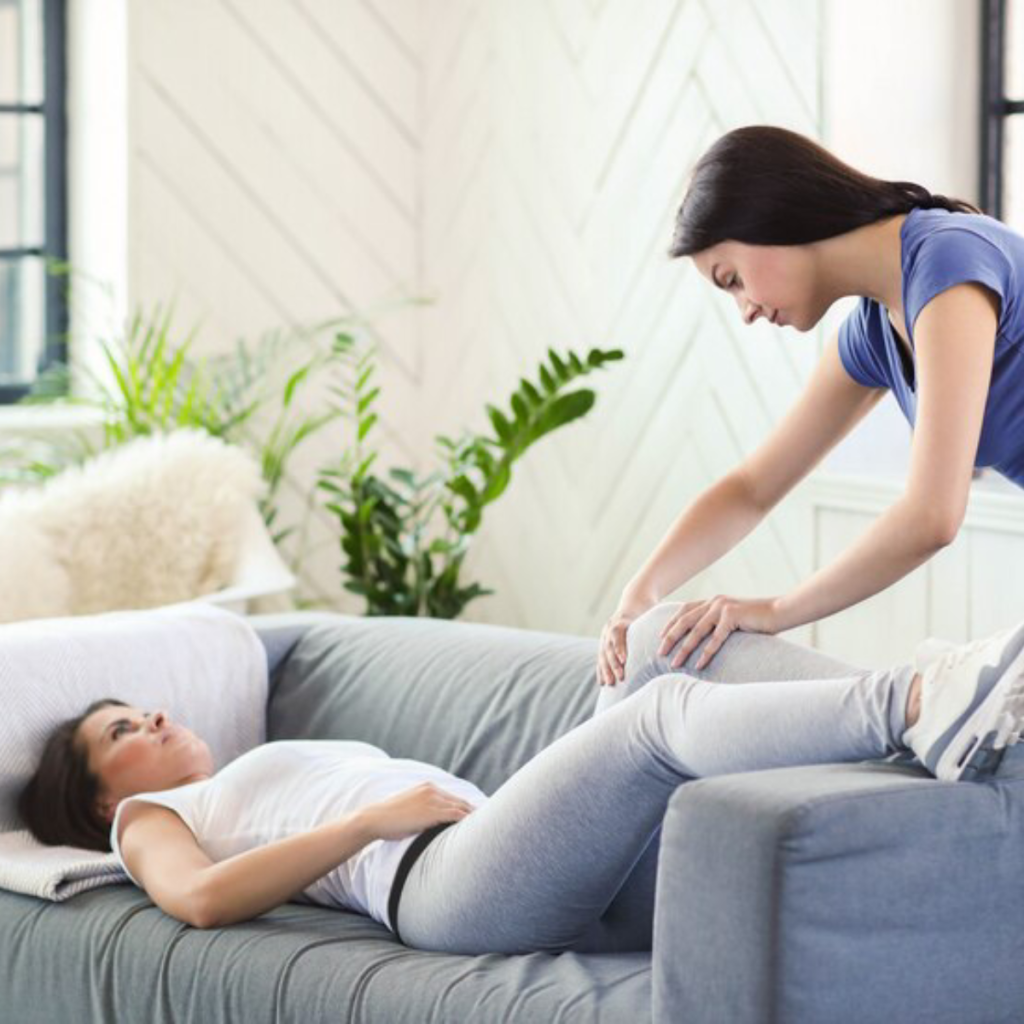Discover the connection between previous back injuries and postpartum back pain.
Can Previous Back Injuries Increase Postpartum Back Pain?
Do you hear that, new moms? The trials and tribulations of pregnancy can leave your back feeling like it’s been through a wrestling match with a sumo wrestler. But what if you already had a back injury in the past? Can that increase your postpartum back pain?

Understanding Back Injuries
Before we dive into the world of postpartum back pain, let’s take a moment to understand back injuries. These sneaky little troublemakers can range from minor strains to more serious issues like herniated discs or fractures. Ouch!
Back injuries can be a real pain in the, well, back. They can disrupt your daily life and make even the simplest of tasks feel like an Olympic feat. From muscle strains to sprained ligaments and bulging discs, these sly culprits come in many shapes and sizes.
Imagine this: you’re getting ready to tie your shoes, something you’ve done countless times before without a second thought. But today, as you bend down, a sharp pain shoots through your lower back, making you wince in agony. It’s as if your back has suddenly turned against you, transforming a mundane activity into a painful ordeal.
So, how do these back injuries occur? Well, they love to strike when you least expect it. It could be something as innocent as lifting a box of diapers or showing off your impressive breakdancing moves at a baby shower. Yes, even the most mundane activities or seemingly harmless dance moves can become the perfect opportunity for a back injury to sneak up on you.
Poor posture is also a common culprit. Slouching at your desk for hours on end or hunching over your phone can put unnecessary strain on your back, making it more susceptible to injury. And let’s not forget about improper lifting techniques. When you lift heavy objects without using the proper form, you’re essentially asking for trouble. Your back is not designed to bear excessive weight in awkward positions, and doing so can lead to strains, sprains, and even more serious issues.
Awkward twisting motions can also make you a target for these pesky pain-inducers. Picture this: you’re reaching for something behind you while simultaneously twisting your torso. Suddenly, you feel a sharp twinge in your back, and the pain sets in. It’s moments like these when you realize just how delicate and vulnerable your back can be.
The Connection Between Back Injuries and Pregnancy
Now that we’ve got a handle on back injuries, let’s dive into the special connection they have with pregnancy. You see, pregnancy brings about a whole truckload of physical changes, and your back feels the brunt of it.
Pregnancy is a miraculous journey filled with joy and anticipation, but it also comes with its fair share of challenges. One of the most common complaints among pregnant women is back pain. The physical changes that occur during pregnancy can put a significant strain on the back, leading to discomfort and sometimes even injury.
Physical Changes During Pregnancy
During those nine precious months, your body is going through some serious renovations. Your lovely baby bump is growing, your center of gravity is shifting, and your ligaments are becoming looser than a rubber band. It’s like your body decided to remodel without giving you any notice!
As your baby grows, your uterus expands, putting pressure on the surrounding structures, including the spine. This added weight and pressure can cause the natural curve of your lower back to increase, leading to lower back pain. Additionally, the shift in your center of gravity can throw off your posture, further contributing to back discomfort.
But it’s not just the physical changes in your abdomen that affect your back. The hormonal changes that occur during pregnancy also play a role. Relaxin, a hormone produced during pregnancy, helps to loosen the ligaments in the pelvic area in preparation for childbirth. However, this hormone can also affect the ligaments in the back, making them more prone to injury and strain.
Impact of Pregnancy on a Previously Injured Back
If you already had a back injury in your past, pregnancy can be like adding an extra cherry on top of your pain sundae. Those physical changes we just mentioned? Yeah, they can wreak havoc on your already sensitive back. It’s like your body’s way of playing a twisted game of double trouble.
When you combine the increased weight, the shift in center of gravity, and the loosening of ligaments with a pre-existing back injury, the result can be intensified pain and discomfort. The strain placed on the injured area can exacerbate the symptoms and make everyday activities even more challenging.
It’s important for women with a history of back injuries to take extra precautions during pregnancy. This may involve working closely with healthcare professionals, such as physical therapists or chiropractors, to develop a customized exercise and treatment plan that can help manage pain and prevent further injury.
Remember, pregnancy is a beautiful and transformative experience, but it’s essential to prioritize your health and well-being during this time. By understanding the connection between back injuries and pregnancy and taking appropriate measures, you can navigate this journey with greater comfort and ease.
Postpartum Back Pain Explained
Postpartum back pain is like that unexpected guest who refuses to leave your house after a party. It’s not uncommon for moms to experience discomfort in their backs once the baby has made its grand entrance into the world.
But why does postpartum back pain occur? Let’s explore the causes in more detail.

Causes of Postpartum Back Pain
There are a few culprits behind postpartum back pain. It could be the result of weakened muscles, the strain of carrying your little bundle of joy, or even the way you move and lift. Your body has just endured the super feat of childbirth, so a little bit of back pain is almost like a twisted souvenir.
One of the main causes of postpartum back pain is the weakened muscles. During pregnancy, your abdominal muscles stretch and weaken to accommodate the growing baby. This puts extra pressure on your back muscles, leading to discomfort and pain.
Additionally, the strain of carrying your baby can also contribute to postpartum back pain. As your little one grows, the weight they put on your arms and back increases, causing strain on your muscles and spine.
Furthermore, the way you move and lift can also play a role in postpartum back pain. As a new mom, you may find yourself constantly bending over to pick up your baby, which can strain your back muscles. Improper lifting techniques can further exacerbate the issue.
It’s important to note that postpartum back pain is a common experience for many moms, and it usually resolves on its own with time and proper care.
The Role of Hormones in Postpartum Back Pain
Oh, hormones, those sneaky little troublemakers. They play a significant role in causing postpartum back pain. During pregnancy, your body produces a hormone called relaxin, which loosens up your ligaments all over. This might sound good at first, as it helps your body accommodate the growing baby, but it can also leave your back feeling as stable as a Jenga tower after a mischievous toddler gets hold of it.
Relaxin is essential during pregnancy to allow your pelvis to expand and make room for childbirth. However, its effects can linger postpartum, making your ligaments looser than usual. This increased laxity can lead to instability in your back, resulting in pain and discomfort.
While hormones are a natural part of the postpartum journey, they can sometimes wreak havoc on your body. It’s important to take care of yourself and seek appropriate treatment if the back pain becomes severe or persistent.
In conclusion, postpartum back pain is a common occurrence for many moms. It can be caused by weakened muscles, the strain of carrying your baby, and the effects of hormones on your ligaments. Understanding the causes can help you navigate this discomfort and find ways to alleviate the pain, allowing you to fully enjoy the joys of motherhood.
The Link Between Previous Back Injuries and Postpartum Back Pain
Now that we have a grasp on postpartum back pain, let’s explore the connection between those past injuries and the pain you experience post-baby.
When it comes to postpartum back pain, it seems that the past can come back to haunt you. Research has shown that having a previous back injury can increase the likelihood of experiencing postpartum back pain. It’s like your past injury leaves behind a little ticking time bomb that decides to detonate when you least expect it. Thanks a lot, Mr. Injury!
But why does a previous back injury have such an impact on postpartum pain? Well, it turns out that scar tissue, the not-so-pretty souvenir from past injuries, can also contribute to postpartum back pain. Scar tissue has a pesky habit of reducing flexibility and causing discomfort. It’s like an unwanted guest crashing the post-baby party, making you wish you had invested in better security measures.
So, not only do you have to deal with the challenges of postpartum recovery, but you may also have to contend with the lingering effects of a previous back injury. It’s a double whammy that can make the already demanding task of caring for a newborn even more challenging.
But fear not! Understanding the link between previous back injuries and postpartum back pain is the first step towards finding relief. By knowing the factors that contribute to your pain, you can take proactive measures to manage it and ensure a smoother recovery.
Whether it’s seeking professional help from a physical therapist, practicing gentle exercises to strengthen your back muscles, or incorporating relaxation techniques into your daily routine, there are various strategies you can employ to alleviate postpartum back pain.
Remember, you’re not alone in this journey. Many women experience postpartum back pain, and with the right support and resources, you can overcome it and focus on enjoying the precious moments with your little one.
Managing Postpartum Back Pain with a History of Back Injuries
Enough with the doom and gloom! Let’s talk about how to manage postpartum back pain if you have a history of back injuries.
Pain Management Techniques
When it comes to managing postpartum back pain, the name of the game is finding what works for you. Some moms find relief through heat or ice therapy, while others turn to gentle exercises or stretches. Consult with your healthcare provider to figure out the best approach for your unique situation.
Physical Therapy and Rehabilitation
Physical therapy and rehabilitation can also be valuable tools in recovering from postpartum back pain with a history of back injuries. Working with a qualified professional can help strengthen your core muscles, improve your posture, and reduce any lingering discomfort. Who knew therapy could be so therapeutic?
So, new moms, the answer to the burning question is yes, previous back injuries can increase postpartum back pain. However, armed with a little knowledge and some proactive strategies, you can conquer the pain and get back to enjoying those precious moments with your little one. Remember, you’re a superhero, and superheroes always find a way to overcome their challenges, capes optional!



